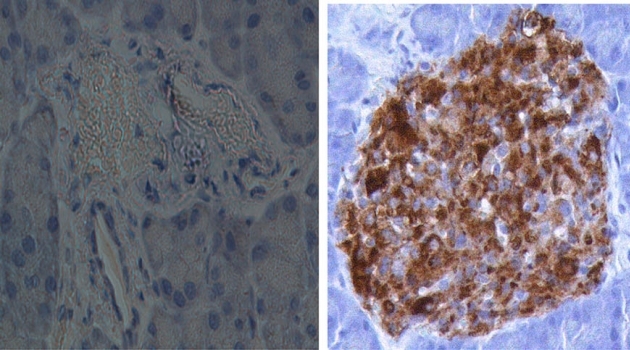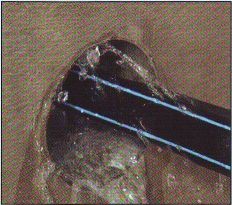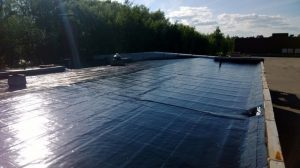A representative image of islets from diabetic mice, which did not receive IL-35 (left) and received IL-35 (right). The brown color represent insulin producing beta cells.

New research from Uppsala University shows promising progress in the use of anti-inflammatory cytokine for treatment of type 1 diabetes. The study, published in the open access journal Scientific Reports (Nature Publishing Group), reveals that administration of interleukin-35 (a protein made by immune cells) to mice with type 1 diabetes, reverses or cures the disease by maintaining a normal blood glucose level and the immune tolerance.
Type 1 diabetes (T1D) is a chronic disease, which for the patients leads to a life-long dependence of daily injections of insulin. In Sweden approximately 2 new cases of the disease are diagnosed every day. Insulin is a hormone, which is produced by the beta cells in the pancreas. Insulin is required to prevent a harmful rise in the blood glucose level.
The exact cause of T1D is not yet known, however, it is considered as an autoimmune disease. A condition that occurs when our own immune system by mistake attack and destroy healthy cells. In T1D, an infection and/or unknown factors probably triggers the immune cell attack, which ultimately leads to an insufficient insulin production.
In the new study, Kailash Singh, a PhD student in professor Stellan Sandler’s research group at the Department of Medical Cell Biology at Uppsala University, studied so-called immune regulatory T cells’ actions in T1D mouse models. The study shows that the immune regulatory T cells alter their function by producing pro-inflammatory destructive proteins instead of protective anti-inflammatory proteins such as interleukin-35 (IL-35) under T1D conditions.
“This suggests that the good guys have gone bad in early development of Type 1 diabetes and therefore our immune cells destroy the beta cell”, says Dr. Kailash Singh.
Furthermore, the concentration of IL-35 was lower in T1D patients compared to healthy individuals. These findings may suggest that IL-35 could play a crucial role in human T1D. In addition, the researchers have found a novel mechanism that explains how the immune regulatory T cells are changing their destiny under a T1D condition.
Professor Sandler’s research team tested whether or not IL-35 could also suppress development of T1D and reverse established T1D. To induce T1D in mice they injected a chemical compound called streptozotocin. These mice developed signs of TID and increasing blood glucose levels similar as in human T1D. IL-35 injections given after disease induction prevented from development of T1D. Strikingly, IL-35 injections to mice, which were diabetic for two consecutive days, normalized blood glucose concentrations.
The research team also successfully investigated IL-35 in another model of T1D called non-obese diabetic mouse (NOD). The interruption of IL-35 treatment did not result in return of diabetes in any of the mouse models.
The findings encourage further research on the use of IL-35 for treatment of T1D and offer new clues as to why immune regulatory T cells fail in counteracting T1D.
“To the best of our knowledge, we are the first to show that IL-35 can reverse established Type 1 diabetes in two different mouse models and that the concentration of the particular cytokine is lower in Type 1 diabetes patients than in healthy individuals. Also, we are providing an insight into a novel mechanism: how immune regulatory T cells change their fate under autoimmune conditions”, says Kailash Singh.
The research has been led by Professor Stellan Sandler, Kailash Singh and Lina Thorvaldson in collaboration with Professor Per-Ola Carlsson and Daniel Espes at the Department of Medical Cell Biology, Uppsala University, Sweden.
Publication: Singh, K. et al. Interleukin-35 administration counteracts established murine type1 diabetes – possible involvement of regulatory T cells. Sci. Rep. 5, 12633; DOI: 10.1038/srep12633 (2015).
sursa: http://xexe.club/62804-promising-progress-for-new-treatment-of-type-1-diabetes.html
Doriti mai multe informatii despre vindecarea diabetului? Contactati-ne acum!


Reparații la terase
https://terase.afacereamea.ro/
Pentru terasele de bloc sau de birouri acoperite cu membrane bituminoase cele mai potrivite produse de reparatii sunt IMPERMIX PU. Aveti garantii adevarate de 10-35 de ani. Practic sunt inerte la influentele de mediu iar durata lor de viata este nelimitata.
 Programati-va acum interventia pe terase ca sa nu fie prea tarziu.
Programati-va acum interventia pe terase ca sa nu fie prea tarziu.
Aveți infiltrații?
Aveți treceri / străpungeri / penetrări de cabluri / țevi / conducte prin pereți, planșee și pardoseli ce manifestă infiltrații sa exfiltrații! Aveți fisuri prin pereți și pardoseli?

Avem soluții corecte și complete.
Doar vizitați https://strapungeri.afacereamea.ro/ și puteți să găsiți produsele și soluțiile corecte pentru situația dvs concretă. Puteți și să vă abonați pentru discounturi și comisioane.





Niciun comentariu până acum